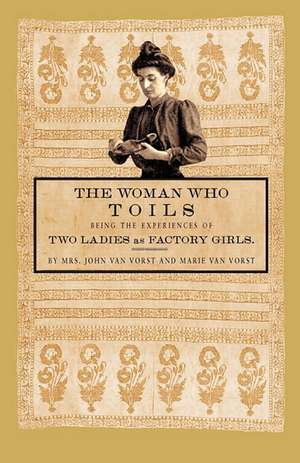Woman Who Toils: Being the Experiences of Two Ladies as Factory Girls
Theodore IV Roosevelt Autor Bessie Van Vorsten Limba Engleză Paperback – 30 sep 2010
Bessie (Mrs. John) Van Vorst and her sister-in-law Marie Van Vorst were both from New York's privileged class at the turn of the 20th century. The pair worked for several months under assumed names - Bessie as Esther Kelly, Marie as Bell Ballard - to dsicover first-hand the working conditions, values, and ambitions of factory girls. From a Pittsburgh pickle factory to a Lynn, Massachusetts shoe factory to a cotton mill in South Carolina, the two wrote of their experiences in what was considered a landmark work of social investigation. This fascinating account, originally published in 1903, includes an introductory letter from President Theodore Roosevelt.
Preț: 188.78 lei
Nou
Puncte Express: 283
Preț estimativ în valută:
36.12€ • 37.71$ • 29.90£
36.12€ • 37.71$ • 29.90£
Carte tipărită la comandă
Livrare economică 04-18 aprilie
Preluare comenzi: 021 569.72.76
Specificații
ISBN-13: 9781429040891
ISBN-10: 1429040890
Pagini: 354
Dimensiuni: 141 x 218 x 23 mm
Greutate: 0.46 kg
Editura: Applewood Books
ISBN-10: 1429040890
Pagini: 354
Dimensiuni: 141 x 218 x 23 mm
Greutate: 0.46 kg
Editura: Applewood Books
Extras
PREFATORY LETTER FROM THEODORE ROOSEVELT Written after reading Chapter III. when published serially WHITE HOUSE, WASHINGTON, October 18, 1902. My Dear Mrs. Van Vorst: I must write you a line to say how much I have appre- ciated your article, " The Woman Who Toils. " But to me tliere is a most melancholy side to it, when you touch upon what is fundamentally infinitely more important than any other question in this country that is, the ques- tion of race suicide, complete or partial. An easy, good-natured kindliness, and a desire to be "independent" that is, to live one's life purely according to one's own desires are in no sense substitutes for the fundamental virtues, for the practice of the strong, racial qualities without which there can be no strong races the qualities of courage and resolution in both men and women, of scorn of what is mean, base and selfish, of eager desire to work or fight or suffer as the case may be provided the end to be gained is great enough, and the contemptuous putting aside of mere ease, mere vapid pleasure, tnere avoidance of toil and worry. I do not know whether I most pity or most despise the foolish and selfish man or woman who does not understand that the only things really worth having in life are those the acquirement of which normally means cost and effort. If a man or woman, through no fault of his or hers, goes throughout life denied those highest of all joys which spring only from home life, from the having and bringing up of many healthy children, I feel for them deep and respectful sympathy the sympathy one extends to the gallant fellow killed at the beginning of a campaign, or the man who toils hard and is brought to ruin by the fault of others. But the man or woman who deliberately avoids marriage, and has a heart so cold as to know no passion and a brain so shallow and selfish as to dislike having children, is in effect a criminal against the race, and should be an object of contemptuous abhorrence by all healthy people. Of course no one quality makes u good citizen, and no one quality will save a nation. But there are certain great qualities for the lack of which no amount of intellectual brilliancy or of material prosperity or of easiness of life can atone, and which show decadence and corruption in the nation just as much if they are produced by selfishness and coldness and ease-loving laziness among compara- tively poor people as if they are produced by vicious or frivolous luxury in the rich. If the men of the nation are not anxious to work in many different ways, with all their might and strength, and ready and able to fight at need, and anxious to be fathers of families, and if the women do not recognize that the greatest thing for any woman is to be a good wife and mother, why, that nation has cause to be alarmed about its future. There is no physical trouble among us Americans. The trouble with the situation you set forth is one of character, and therefore we can conquer it if we only will. Very sincerely yours, THEODORE ROOSEVELT
Notă biografică
1878-1928
Descriere
This landmark work of social investigation was written in 1903 by two women of New York's privileged class, who assumed names and toiled as factory girls in a number of eastern U.S.locations.
